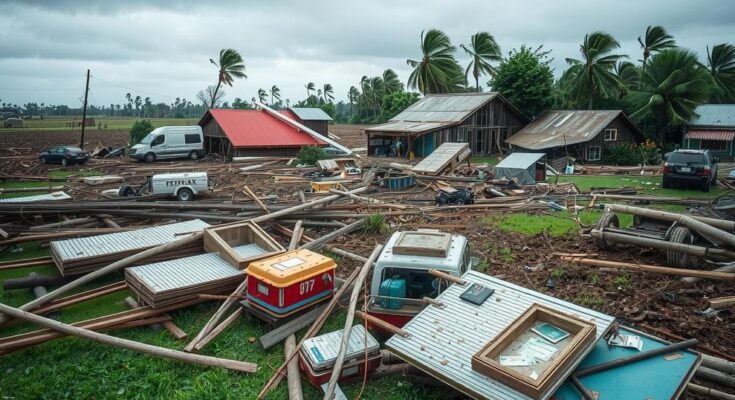Farmers in South Georgia are still recovering from the devastating effects of Hurricane Helene, which struck in September 2023, inflicting losses exceeding $10 billion across the agriculture sector. Crop destruction, particularly in cotton and pecans, has led to financial distress, with losses reported to surpass $5.5 billion in Georgia alone. Immediate relief measures are currently hindered by legislative constraints, exacerbating the farmers’ struggles to rebuild their livelihoods.
Farmers in Georgia continue to struggle in the aftermath of Hurricane Helene, which struck as a powerful Category 4 storm on September 26, leaving a path of destruction across the South. The devastation is evident on Chris Hopkins’ farm, where overturned equipment and damaged crops serve as reminders of the storm’s impact. With estimates suggesting over $10 billion in losses across Florida to Virginia, farmers are left contemplating their future amidst significant emotional and financial strain. Helene’s destruction has dramatically affected crop yields, particularly for cotton and pecan growers, who report staggering losses. The University of Georgia estimates that Georgia farmers alone sustained losses exceeding $5.5 billion, while recovery efforts are complicated by insufficient immediate government support. Farmers like Hopkins fear for their livelihoods as they attempt to navigate the repercussions of this disaster.
Efforts are underway to provide financial assistance, with Georgia’s government reallocating funds for emergency loans, yet constitutional restrictions inhibit direct disaster aid. Meanwhile, the Poultry Federation estimates that Georgia’s poultry industry has incurred approximately $683 million in damages. While economists suggest consumer prices may not be heavily impacted due to crop availability from other regions, growers still face uncertain futures as they bear the brunt of the storm’s economic toll. Ultimately, Hurricane Helene’s aftermath serves as a stark reminder of the challenges faced by agricultural communities and the urgent need for timely relief efforts.
Hurricane Helene made landfall in Florida in late September 2023 and subsequently caused widespread destruction across the southeastern United States. The storm’s force resulted in extensive losses for farmers, particularly in Georgia, where cotton and pecan crops were heavily damaged. In addition to the direct destruction of crops, the storm also significantly affected infrastructure and machinery necessary for farming operations. With total damages estimated to reach over $10 billion across multiple states, the agricultural sector faces both immediate and long-term recovery challenges.
In conclusion, Hurricane Helene has left a lasting impact on farmers throughout the South, inflicting severe economic losses and emotional upheaval. With agricultural damage estimates in the billions and a slow recovery process underway, it is imperative for support mechanisms to be established quickly to assist those affected. The resilience of farmers like Chris Hopkins and Jeffrey Pridgen is commendable, yet their futures remain precarious as they confront the overwhelming challenges posed by this catastrophic event.
Original Source: www.agrinews-pubs.com




